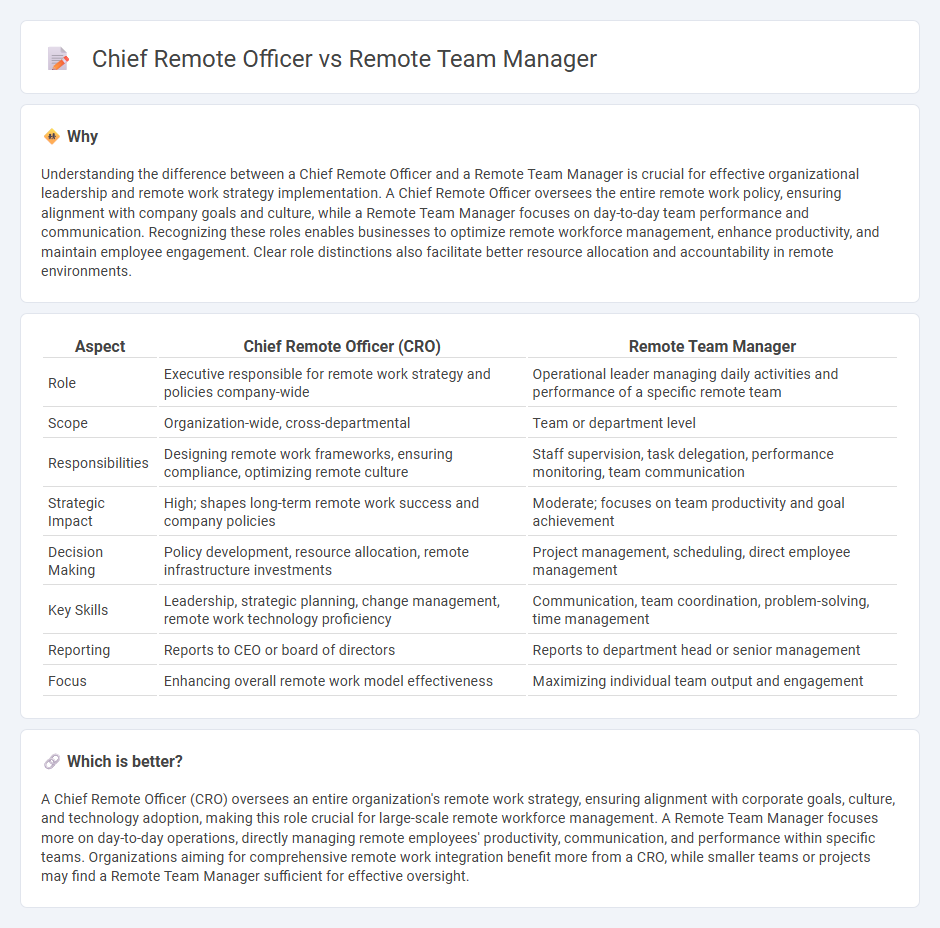
A Chief Remote Officer (CRO) drives strategic leadership and oversees organizational adaptation to remote work models, ensuring alignment with corporate goals and culture. Remote Team Managers focus on operational management, directly supervising remote employees to enhance productivity, communication, and workflow efficiency. Explore the distinct roles and responsibilities to optimize your remote work strategy.
Why it is important
Understanding the difference between a Chief Remote Officer and a Remote Team Manager is crucial for effective organizational leadership and remote work strategy implementation. A Chief Remote Officer oversees the entire remote work policy, ensuring alignment with company goals and culture, while a Remote Team Manager focuses on day-to-day team performance and communication. Recognizing these roles enables businesses to optimize remote workforce management, enhance productivity, and maintain employee engagement. Clear role distinctions also facilitate better resource allocation and accountability in remote environments.
Comparison Table
| Aspect | Chief Remote Officer (CRO) | Remote Team Manager |
|---|---|---|
| Role | Executive responsible for remote work strategy and policies company-wide | Operational leader managing daily activities and performance of a specific remote team |
| Scope | Organization-wide, cross-departmental | Team or department level |
| Responsibilities | Designing remote work frameworks, ensuring compliance, optimizing remote culture | Staff supervision, task delegation, performance monitoring, team communication |
| Strategic Impact | High; shapes long-term remote work success and company policies | Moderate; focuses on team productivity and goal achievement |
| Decision Making | Policy development, resource allocation, remote infrastructure investments | Project management, scheduling, direct employee management |
| Key Skills | Leadership, strategic planning, change management, remote work technology proficiency | Communication, team coordination, problem-solving, time management |
| Reporting | Reports to CEO or board of directors | Reports to department head or senior management |
| Focus | Enhancing overall remote work model effectiveness | Maximizing individual team output and engagement |
Which is better?
A Chief Remote Officer (CRO) oversees an entire organization's remote work strategy, ensuring alignment with corporate goals, culture, and technology adoption, making this role crucial for large-scale remote workforce management. A Remote Team Manager focuses more on day-to-day operations, directly managing remote employees' productivity, communication, and performance within specific teams. Organizations aiming for comprehensive remote work integration benefit more from a CRO, while smaller teams or projects may find a Remote Team Manager sufficient for effective oversight.
Connection
The Chief Remote Officer (CRO) establishes strategic frameworks and policies that guide the management of distributed teams, ensuring alignment with organizational goals. Remote team managers execute these strategies by overseeing day-to-day operations, maintaining team productivity, and fostering communication across virtual environments. Their collaboration is essential for optimizing remote work efficiency and employee engagement in global organizations.
Key Terms
**Remote Team Manager:**
Remote Team Manager oversees daily operations and performance of distributed teams, ensuring seamless communication and collaboration across time zones. Key responsibilities include managing task allocation, monitoring productivity metrics, and fostering team engagement through virtual tools. Explore more about effective strategies and tools that empower Remote Team Managers to drive remote workforce success.
Team Coordination
A remote team manager directly oversees daily operations, ensuring seamless communication, task delegation, and performance tracking among dispersed team members. In contrast, a chief remote officer develops strategic frameworks and policies to optimize remote work environments across the organization, focusing on long-term coordination and technology integration. Explore more to understand how these roles uniquely enhance team collaboration in remote settings.
Performance Monitoring
Performance monitoring in remote teams requires distinct approaches depending on the role. A Remote Team Manager typically focuses on tracking individual productivity, task completion, and real-time collaboration tools to ensure team objectives are met efficiently. To explore advanced strategies and frameworks implemented by Chief Remote Officers for optimizing remote work performance at an organizational level, learn more here.
Source and External Links
35 Tips for Managing Remote Teams Effectively - The Cannon - This article offers 35 practical strategies to improve communication, productivity, and team cohesion for remote managers, such as using clear communication channels and regular check-ins to maintain alignment and accountability.
How to be a great remote manager - the complete guide - GitLab's comprehensive guide emphasizes being visible and approachable, maintaining constant and transparent communication, and leveraging asynchronous workflows to support diverse remote teams effectively.
6 remote team management styles - This resource highlights best practices for remote team management, including establishing clear communication policies, prioritizing work-life balance, conducting regular check-ins, and focusing on results rather than hours worked.
 dowidth.com
dowidth.com